Ethics in Killing: Philosophical Considerations and Analysis
VerifiedAdded on 2022/11/18
|12
|3566
|2
Essay
AI Summary
This essay delves into the complex ethical considerations surrounding the act of killing, contrasting direct acts of violence with remote methods facilitated by technology. It explores how religious texts and ethical theories, such as Utilitarianism and Kantianism, condemn killing, except in specific cases like euthanasia, which aims to alleviate suffering. The essay examines the justifications offered by killers, such as those who carried out the 9/11 attacks, and critiques the notion that remote killing absolves individuals of moral responsibility. It uses examples like the Hiroshima and Nagasaki bombings and fictional scenarios from movies like "The Terminator" to highlight the ethical dilemmas of indirect killing. The essay argues that regardless of the method, the act of taking a life remains inherently unethical, emphasizing the importance of moral responsibility in a world increasingly reliant on advanced technologies for violence.
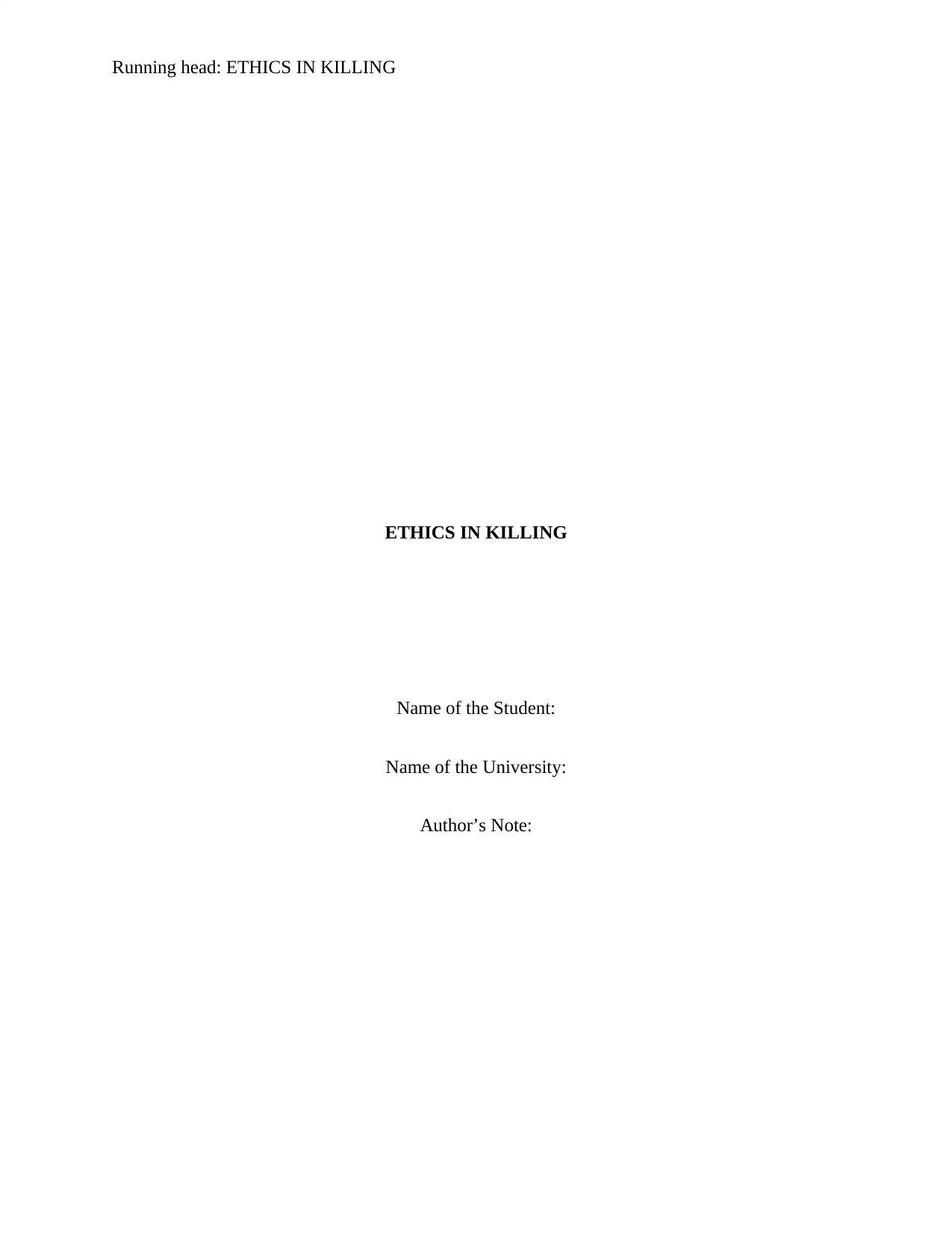
Running head: ETHICS IN KILLING
ETHICS IN KILLING
Name of the Student:
Name of the University:
Author’s Note:
ETHICS IN KILLING
Name of the Student:
Name of the University:
Author’s Note:
Paraphrase This Document
Need a fresh take? Get an instant paraphrase of this document with our AI Paraphraser
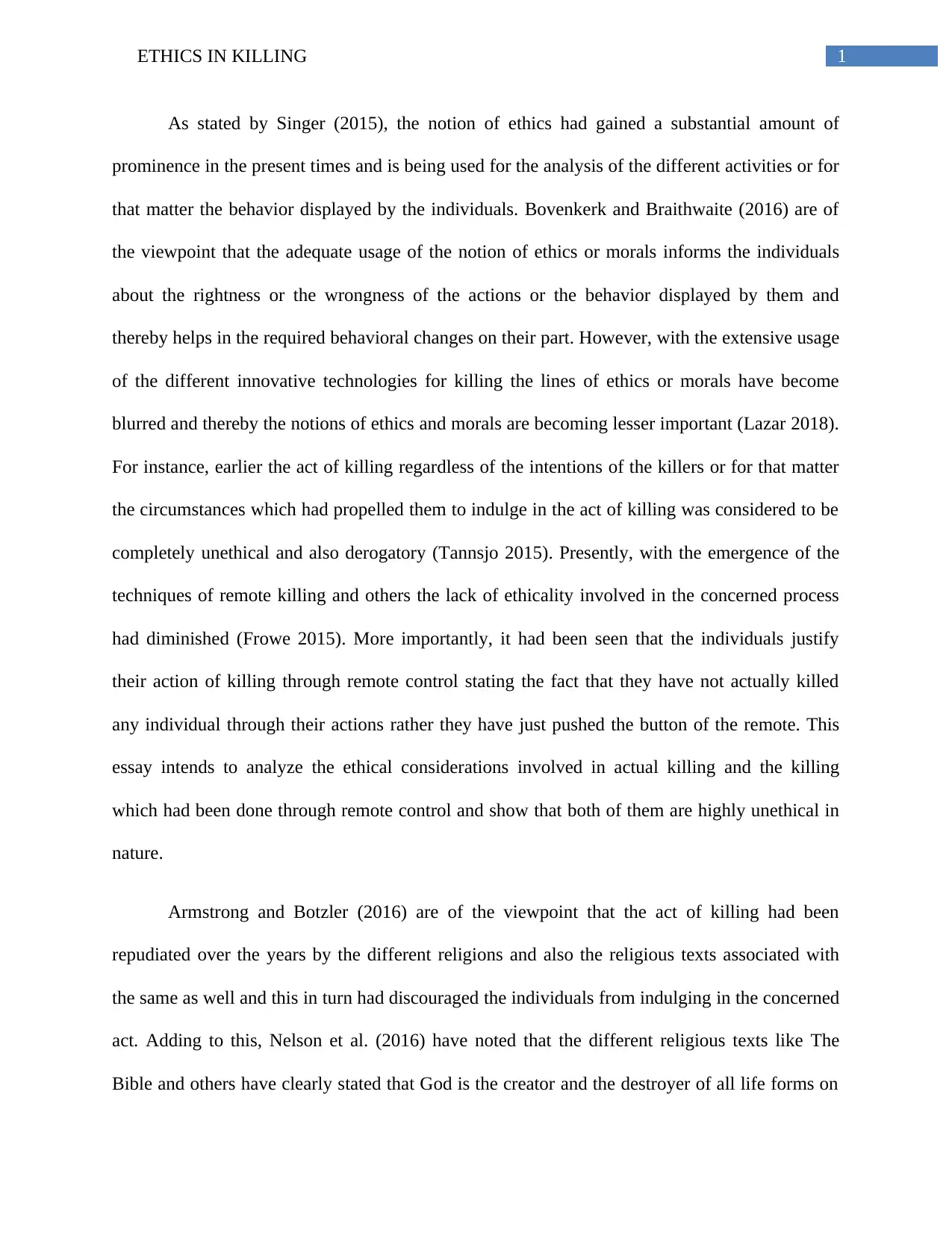
1ETHICS IN KILLING
As stated by Singer (2015), the notion of ethics had gained a substantial amount of
prominence in the present times and is being used for the analysis of the different activities or for
that matter the behavior displayed by the individuals. Bovenkerk and Braithwaite (2016) are of
the viewpoint that the adequate usage of the notion of ethics or morals informs the individuals
about the rightness or the wrongness of the actions or the behavior displayed by them and
thereby helps in the required behavioral changes on their part. However, with the extensive usage
of the different innovative technologies for killing the lines of ethics or morals have become
blurred and thereby the notions of ethics and morals are becoming lesser important (Lazar 2018).
For instance, earlier the act of killing regardless of the intentions of the killers or for that matter
the circumstances which had propelled them to indulge in the act of killing was considered to be
completely unethical and also derogatory (Tannsjo 2015). Presently, with the emergence of the
techniques of remote killing and others the lack of ethicality involved in the concerned process
had diminished (Frowe 2015). More importantly, it had been seen that the individuals justify
their action of killing through remote control stating the fact that they have not actually killed
any individual through their actions rather they have just pushed the button of the remote. This
essay intends to analyze the ethical considerations involved in actual killing and the killing
which had been done through remote control and show that both of them are highly unethical in
nature.
Armstrong and Botzler (2016) are of the viewpoint that the act of killing had been
repudiated over the years by the different religions and also the religious texts associated with
the same as well and this in turn had discouraged the individuals from indulging in the concerned
act. Adding to this, Nelson et al. (2016) have noted that the different religious texts like The
Bible and others have clearly stated that God is the creator and the destroyer of all life forms on
As stated by Singer (2015), the notion of ethics had gained a substantial amount of
prominence in the present times and is being used for the analysis of the different activities or for
that matter the behavior displayed by the individuals. Bovenkerk and Braithwaite (2016) are of
the viewpoint that the adequate usage of the notion of ethics or morals informs the individuals
about the rightness or the wrongness of the actions or the behavior displayed by them and
thereby helps in the required behavioral changes on their part. However, with the extensive usage
of the different innovative technologies for killing the lines of ethics or morals have become
blurred and thereby the notions of ethics and morals are becoming lesser important (Lazar 2018).
For instance, earlier the act of killing regardless of the intentions of the killers or for that matter
the circumstances which had propelled them to indulge in the act of killing was considered to be
completely unethical and also derogatory (Tannsjo 2015). Presently, with the emergence of the
techniques of remote killing and others the lack of ethicality involved in the concerned process
had diminished (Frowe 2015). More importantly, it had been seen that the individuals justify
their action of killing through remote control stating the fact that they have not actually killed
any individual through their actions rather they have just pushed the button of the remote. This
essay intends to analyze the ethical considerations involved in actual killing and the killing
which had been done through remote control and show that both of them are highly unethical in
nature.
Armstrong and Botzler (2016) are of the viewpoint that the act of killing had been
repudiated over the years by the different religions and also the religious texts associated with
the same as well and this in turn had discouraged the individuals from indulging in the concerned
act. Adding to this, Nelson et al. (2016) have noted that the different religious texts like The
Bible and others have clearly stated that God is the creator and the destroyer of all life forms on
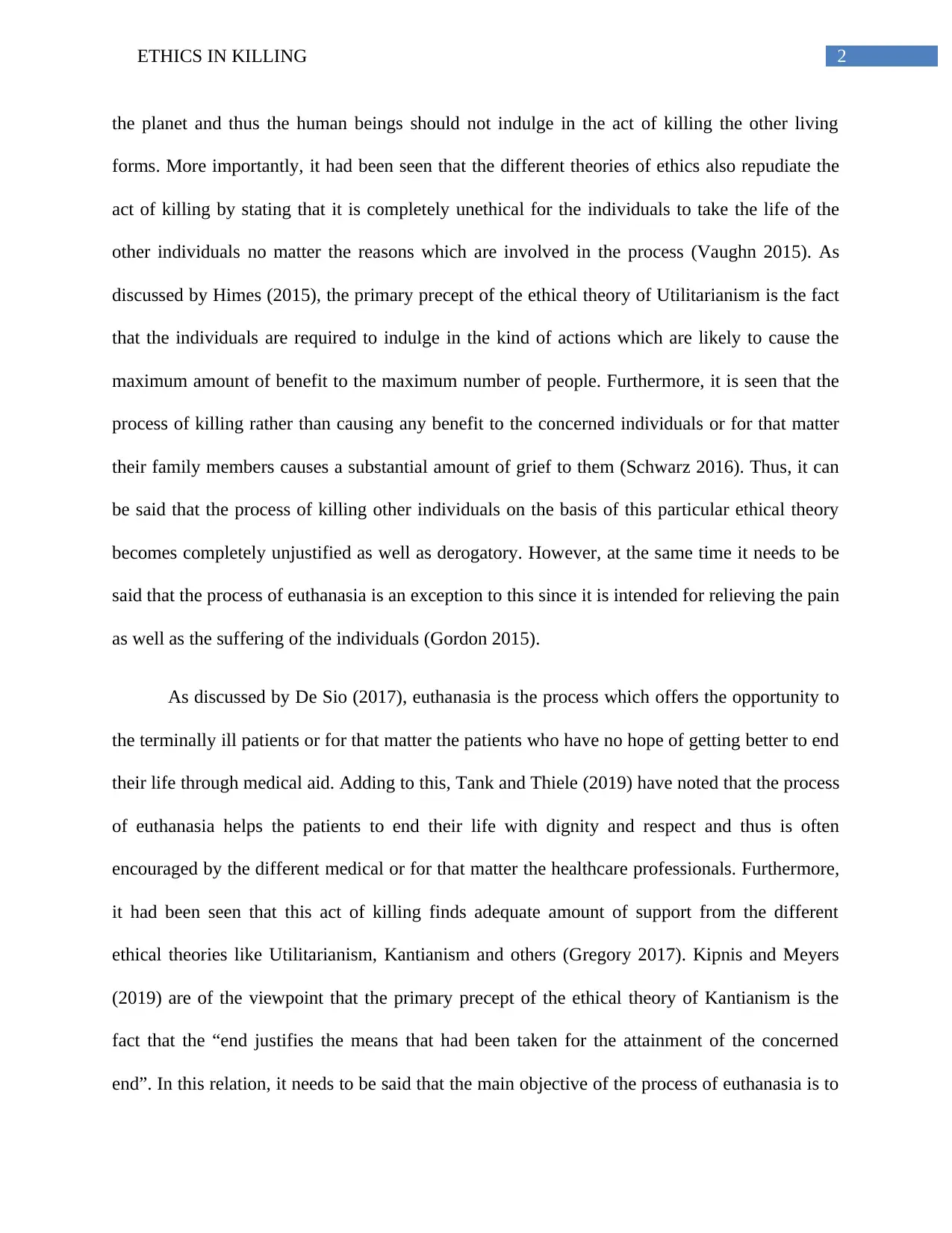
2ETHICS IN KILLING
the planet and thus the human beings should not indulge in the act of killing the other living
forms. More importantly, it had been seen that the different theories of ethics also repudiate the
act of killing by stating that it is completely unethical for the individuals to take the life of the
other individuals no matter the reasons which are involved in the process (Vaughn 2015). As
discussed by Himes (2015), the primary precept of the ethical theory of Utilitarianism is the fact
that the individuals are required to indulge in the kind of actions which are likely to cause the
maximum amount of benefit to the maximum number of people. Furthermore, it is seen that the
process of killing rather than causing any benefit to the concerned individuals or for that matter
their family members causes a substantial amount of grief to them (Schwarz 2016). Thus, it can
be said that the process of killing other individuals on the basis of this particular ethical theory
becomes completely unjustified as well as derogatory. However, at the same time it needs to be
said that the process of euthanasia is an exception to this since it is intended for relieving the pain
as well as the suffering of the individuals (Gordon 2015).
As discussed by De Sio (2017), euthanasia is the process which offers the opportunity to
the terminally ill patients or for that matter the patients who have no hope of getting better to end
their life through medical aid. Adding to this, Tank and Thiele (2019) have noted that the process
of euthanasia helps the patients to end their life with dignity and respect and thus is often
encouraged by the different medical or for that matter the healthcare professionals. Furthermore,
it had been seen that this act of killing finds adequate amount of support from the different
ethical theories like Utilitarianism, Kantianism and others (Gregory 2017). Kipnis and Meyers
(2019) are of the viewpoint that the primary precept of the ethical theory of Kantianism is the
fact that the “end justifies the means that had been taken for the attainment of the concerned
end”. In this relation, it needs to be said that the main objective of the process of euthanasia is to
the planet and thus the human beings should not indulge in the act of killing the other living
forms. More importantly, it had been seen that the different theories of ethics also repudiate the
act of killing by stating that it is completely unethical for the individuals to take the life of the
other individuals no matter the reasons which are involved in the process (Vaughn 2015). As
discussed by Himes (2015), the primary precept of the ethical theory of Utilitarianism is the fact
that the individuals are required to indulge in the kind of actions which are likely to cause the
maximum amount of benefit to the maximum number of people. Furthermore, it is seen that the
process of killing rather than causing any benefit to the concerned individuals or for that matter
their family members causes a substantial amount of grief to them (Schwarz 2016). Thus, it can
be said that the process of killing other individuals on the basis of this particular ethical theory
becomes completely unjustified as well as derogatory. However, at the same time it needs to be
said that the process of euthanasia is an exception to this since it is intended for relieving the pain
as well as the suffering of the individuals (Gordon 2015).
As discussed by De Sio (2017), euthanasia is the process which offers the opportunity to
the terminally ill patients or for that matter the patients who have no hope of getting better to end
their life through medical aid. Adding to this, Tank and Thiele (2019) have noted that the process
of euthanasia helps the patients to end their life with dignity and respect and thus is often
encouraged by the different medical or for that matter the healthcare professionals. Furthermore,
it had been seen that this act of killing finds adequate amount of support from the different
ethical theories like Utilitarianism, Kantianism and others (Gregory 2017). Kipnis and Meyers
(2019) are of the viewpoint that the primary precept of the ethical theory of Kantianism is the
fact that the “end justifies the means that had been taken for the attainment of the concerned
end”. In this relation, it needs to be said that the main objective of the process of euthanasia is to
⊘ This is a preview!⊘
Do you want full access?
Subscribe today to unlock all pages.

Trusted by 1+ million students worldwide
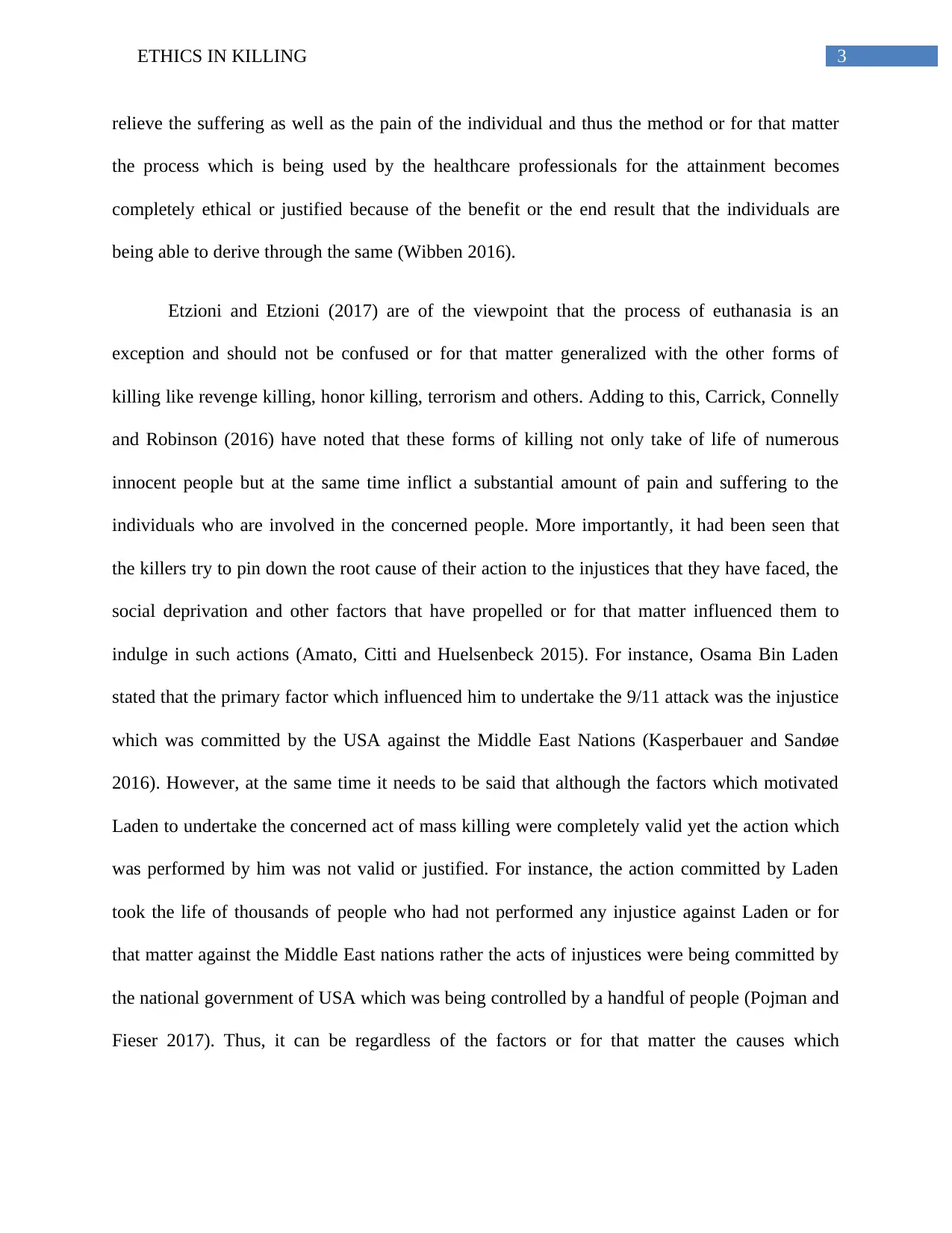
3ETHICS IN KILLING
relieve the suffering as well as the pain of the individual and thus the method or for that matter
the process which is being used by the healthcare professionals for the attainment becomes
completely ethical or justified because of the benefit or the end result that the individuals are
being able to derive through the same (Wibben 2016).
Etzioni and Etzioni (2017) are of the viewpoint that the process of euthanasia is an
exception and should not be confused or for that matter generalized with the other forms of
killing like revenge killing, honor killing, terrorism and others. Adding to this, Carrick, Connelly
and Robinson (2016) have noted that these forms of killing not only take of life of numerous
innocent people but at the same time inflict a substantial amount of pain and suffering to the
individuals who are involved in the concerned people. More importantly, it had been seen that
the killers try to pin down the root cause of their action to the injustices that they have faced, the
social deprivation and other factors that have propelled or for that matter influenced them to
indulge in such actions (Amato, Citti and Huelsenbeck 2015). For instance, Osama Bin Laden
stated that the primary factor which influenced him to undertake the 9/11 attack was the injustice
which was committed by the USA against the Middle East Nations (Kasperbauer and Sandøe
2016). However, at the same time it needs to be said that although the factors which motivated
Laden to undertake the concerned act of mass killing were completely valid yet the action which
was performed by him was not valid or justified. For instance, the action committed by Laden
took the life of thousands of people who had not performed any injustice against Laden or for
that matter against the Middle East nations rather the acts of injustices were being committed by
the national government of USA which was being controlled by a handful of people (Pojman and
Fieser 2017). Thus, it can be regardless of the factors or for that matter the causes which
relieve the suffering as well as the pain of the individual and thus the method or for that matter
the process which is being used by the healthcare professionals for the attainment becomes
completely ethical or justified because of the benefit or the end result that the individuals are
being able to derive through the same (Wibben 2016).
Etzioni and Etzioni (2017) are of the viewpoint that the process of euthanasia is an
exception and should not be confused or for that matter generalized with the other forms of
killing like revenge killing, honor killing, terrorism and others. Adding to this, Carrick, Connelly
and Robinson (2016) have noted that these forms of killing not only take of life of numerous
innocent people but at the same time inflict a substantial amount of pain and suffering to the
individuals who are involved in the concerned people. More importantly, it had been seen that
the killers try to pin down the root cause of their action to the injustices that they have faced, the
social deprivation and other factors that have propelled or for that matter influenced them to
indulge in such actions (Amato, Citti and Huelsenbeck 2015). For instance, Osama Bin Laden
stated that the primary factor which influenced him to undertake the 9/11 attack was the injustice
which was committed by the USA against the Middle East Nations (Kasperbauer and Sandøe
2016). However, at the same time it needs to be said that although the factors which motivated
Laden to undertake the concerned act of mass killing were completely valid yet the action which
was performed by him was not valid or justified. For instance, the action committed by Laden
took the life of thousands of people who had not performed any injustice against Laden or for
that matter against the Middle East nations rather the acts of injustices were being committed by
the national government of USA which was being controlled by a handful of people (Pojman and
Fieser 2017). Thus, it can be regardless of the factors or for that matter the causes which
Paraphrase This Document
Need a fresh take? Get an instant paraphrase of this document with our AI Paraphraser
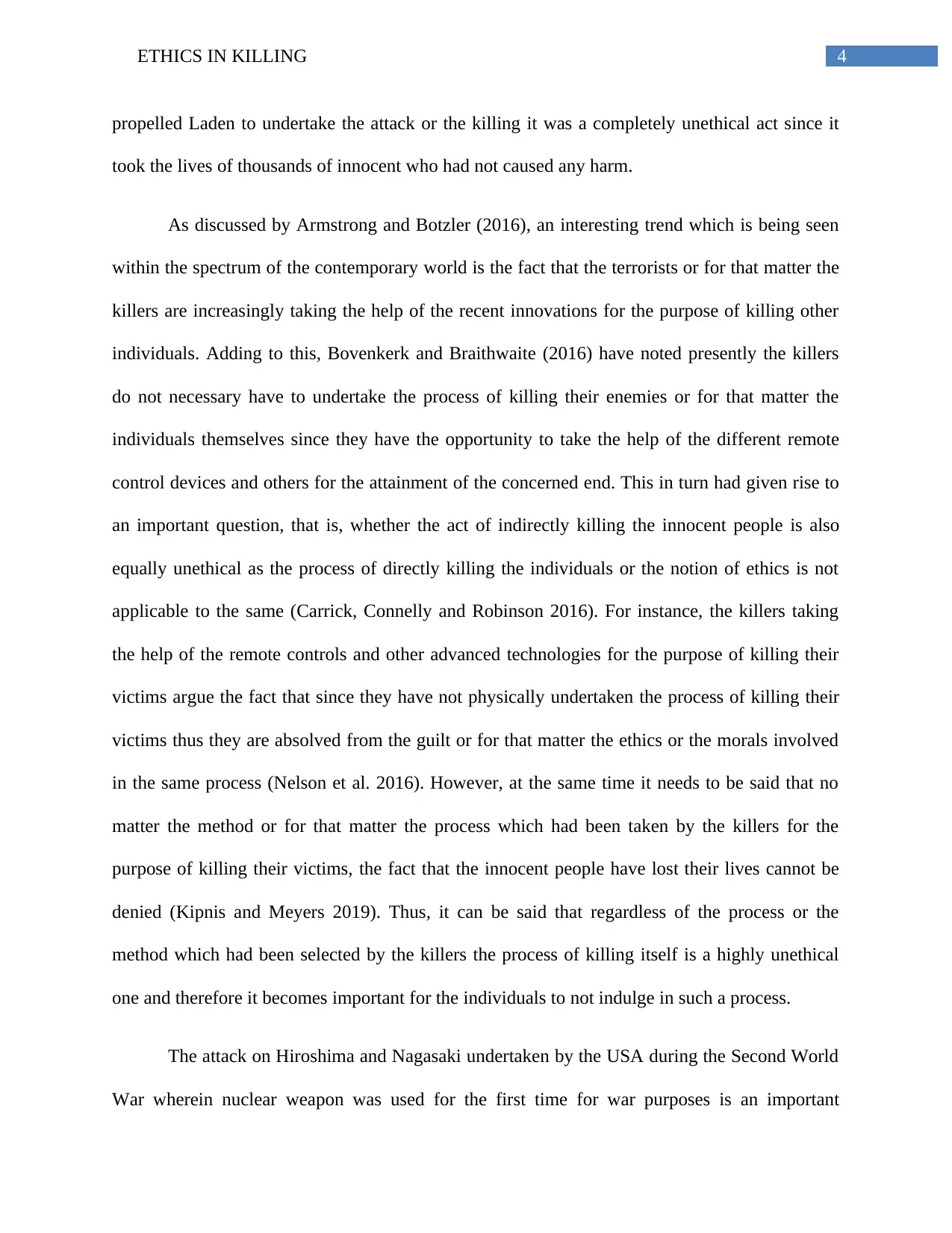
4ETHICS IN KILLING
propelled Laden to undertake the attack or the killing it was a completely unethical act since it
took the lives of thousands of innocent who had not caused any harm.
As discussed by Armstrong and Botzler (2016), an interesting trend which is being seen
within the spectrum of the contemporary world is the fact that the terrorists or for that matter the
killers are increasingly taking the help of the recent innovations for the purpose of killing other
individuals. Adding to this, Bovenkerk and Braithwaite (2016) have noted presently the killers
do not necessary have to undertake the process of killing their enemies or for that matter the
individuals themselves since they have the opportunity to take the help of the different remote
control devices and others for the attainment of the concerned end. This in turn had given rise to
an important question, that is, whether the act of indirectly killing the innocent people is also
equally unethical as the process of directly killing the individuals or the notion of ethics is not
applicable to the same (Carrick, Connelly and Robinson 2016). For instance, the killers taking
the help of the remote controls and other advanced technologies for the purpose of killing their
victims argue the fact that since they have not physically undertaken the process of killing their
victims thus they are absolved from the guilt or for that matter the ethics or the morals involved
in the same process (Nelson et al. 2016). However, at the same time it needs to be said that no
matter the method or for that matter the process which had been taken by the killers for the
purpose of killing their victims, the fact that the innocent people have lost their lives cannot be
denied (Kipnis and Meyers 2019). Thus, it can be said that regardless of the process or the
method which had been selected by the killers the process of killing itself is a highly unethical
one and therefore it becomes important for the individuals to not indulge in such a process.
The attack on Hiroshima and Nagasaki undertaken by the USA during the Second World
War wherein nuclear weapon was used for the first time for war purposes is an important
propelled Laden to undertake the attack or the killing it was a completely unethical act since it
took the lives of thousands of innocent who had not caused any harm.
As discussed by Armstrong and Botzler (2016), an interesting trend which is being seen
within the spectrum of the contemporary world is the fact that the terrorists or for that matter the
killers are increasingly taking the help of the recent innovations for the purpose of killing other
individuals. Adding to this, Bovenkerk and Braithwaite (2016) have noted presently the killers
do not necessary have to undertake the process of killing their enemies or for that matter the
individuals themselves since they have the opportunity to take the help of the different remote
control devices and others for the attainment of the concerned end. This in turn had given rise to
an important question, that is, whether the act of indirectly killing the innocent people is also
equally unethical as the process of directly killing the individuals or the notion of ethics is not
applicable to the same (Carrick, Connelly and Robinson 2016). For instance, the killers taking
the help of the remote controls and other advanced technologies for the purpose of killing their
victims argue the fact that since they have not physically undertaken the process of killing their
victims thus they are absolved from the guilt or for that matter the ethics or the morals involved
in the same process (Nelson et al. 2016). However, at the same time it needs to be said that no
matter the method or for that matter the process which had been taken by the killers for the
purpose of killing their victims, the fact that the innocent people have lost their lives cannot be
denied (Kipnis and Meyers 2019). Thus, it can be said that regardless of the process or the
method which had been selected by the killers the process of killing itself is a highly unethical
one and therefore it becomes important for the individuals to not indulge in such a process.
The attack on Hiroshima and Nagasaki undertaken by the USA during the Second World
War wherein nuclear weapon was used for the first time for war purposes is an important
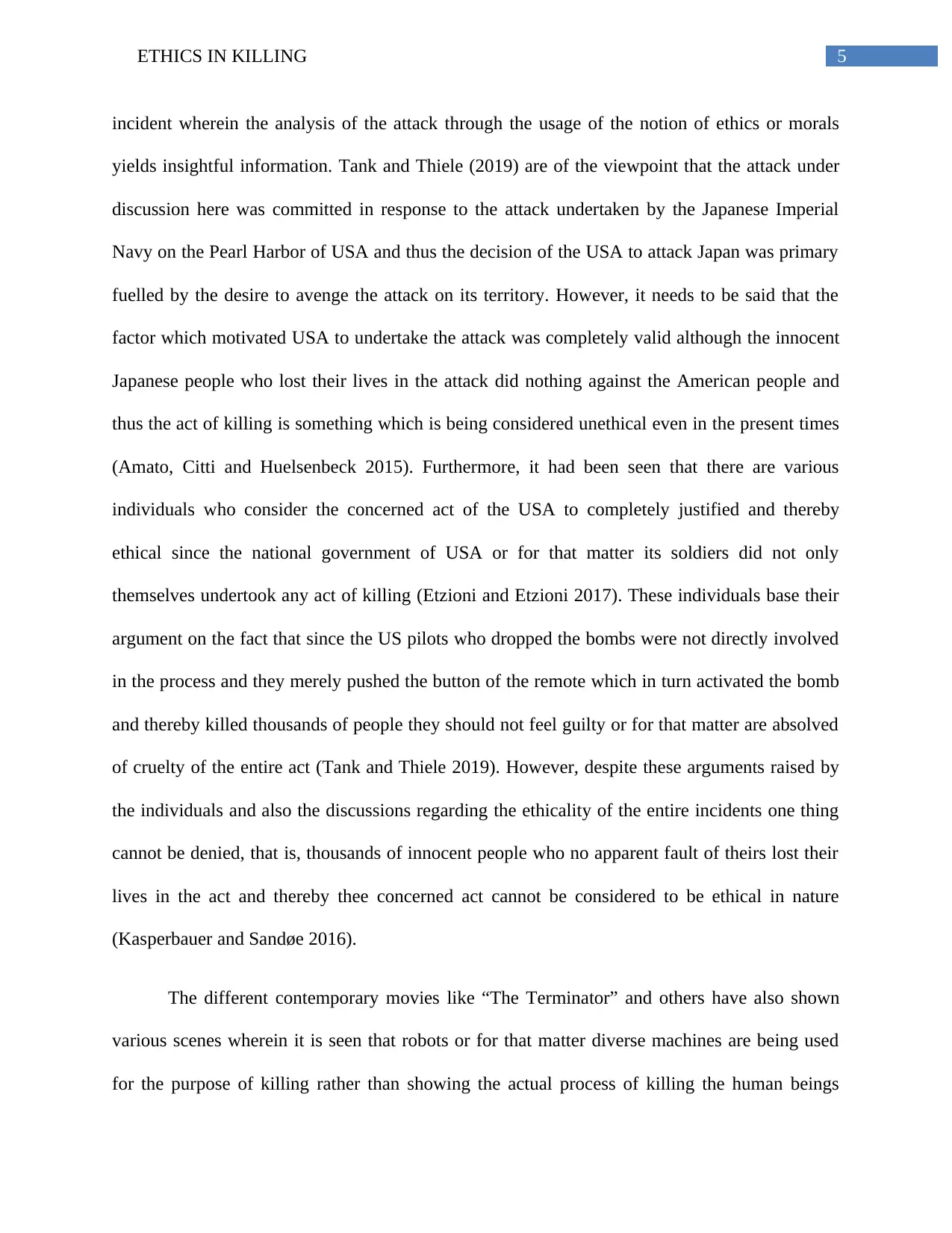
5ETHICS IN KILLING
incident wherein the analysis of the attack through the usage of the notion of ethics or morals
yields insightful information. Tank and Thiele (2019) are of the viewpoint that the attack under
discussion here was committed in response to the attack undertaken by the Japanese Imperial
Navy on the Pearl Harbor of USA and thus the decision of the USA to attack Japan was primary
fuelled by the desire to avenge the attack on its territory. However, it needs to be said that the
factor which motivated USA to undertake the attack was completely valid although the innocent
Japanese people who lost their lives in the attack did nothing against the American people and
thus the act of killing is something which is being considered unethical even in the present times
(Amato, Citti and Huelsenbeck 2015). Furthermore, it had been seen that there are various
individuals who consider the concerned act of the USA to completely justified and thereby
ethical since the national government of USA or for that matter its soldiers did not only
themselves undertook any act of killing (Etzioni and Etzioni 2017). These individuals base their
argument on the fact that since the US pilots who dropped the bombs were not directly involved
in the process and they merely pushed the button of the remote which in turn activated the bomb
and thereby killed thousands of people they should not feel guilty or for that matter are absolved
of cruelty of the entire act (Tank and Thiele 2019). However, despite these arguments raised by
the individuals and also the discussions regarding the ethicality of the entire incidents one thing
cannot be denied, that is, thousands of innocent people who no apparent fault of theirs lost their
lives in the act and thereby thee concerned act cannot be considered to be ethical in nature
(Kasperbauer and Sandøe 2016).
The different contemporary movies like “The Terminator” and others have also shown
various scenes wherein it is seen that robots or for that matter diverse machines are being used
for the purpose of killing rather than showing the actual process of killing the human beings
incident wherein the analysis of the attack through the usage of the notion of ethics or morals
yields insightful information. Tank and Thiele (2019) are of the viewpoint that the attack under
discussion here was committed in response to the attack undertaken by the Japanese Imperial
Navy on the Pearl Harbor of USA and thus the decision of the USA to attack Japan was primary
fuelled by the desire to avenge the attack on its territory. However, it needs to be said that the
factor which motivated USA to undertake the attack was completely valid although the innocent
Japanese people who lost their lives in the attack did nothing against the American people and
thus the act of killing is something which is being considered unethical even in the present times
(Amato, Citti and Huelsenbeck 2015). Furthermore, it had been seen that there are various
individuals who consider the concerned act of the USA to completely justified and thereby
ethical since the national government of USA or for that matter its soldiers did not only
themselves undertook any act of killing (Etzioni and Etzioni 2017). These individuals base their
argument on the fact that since the US pilots who dropped the bombs were not directly involved
in the process and they merely pushed the button of the remote which in turn activated the bomb
and thereby killed thousands of people they should not feel guilty or for that matter are absolved
of cruelty of the entire act (Tank and Thiele 2019). However, despite these arguments raised by
the individuals and also the discussions regarding the ethicality of the entire incidents one thing
cannot be denied, that is, thousands of innocent people who no apparent fault of theirs lost their
lives in the act and thereby thee concerned act cannot be considered to be ethical in nature
(Kasperbauer and Sandøe 2016).
The different contemporary movies like “The Terminator” and others have also shown
various scenes wherein it is seen that robots or for that matter diverse machines are being used
for the purpose of killing rather than showing the actual process of killing the human beings
⊘ This is a preview!⊘
Do you want full access?
Subscribe today to unlock all pages.

Trusted by 1+ million students worldwide
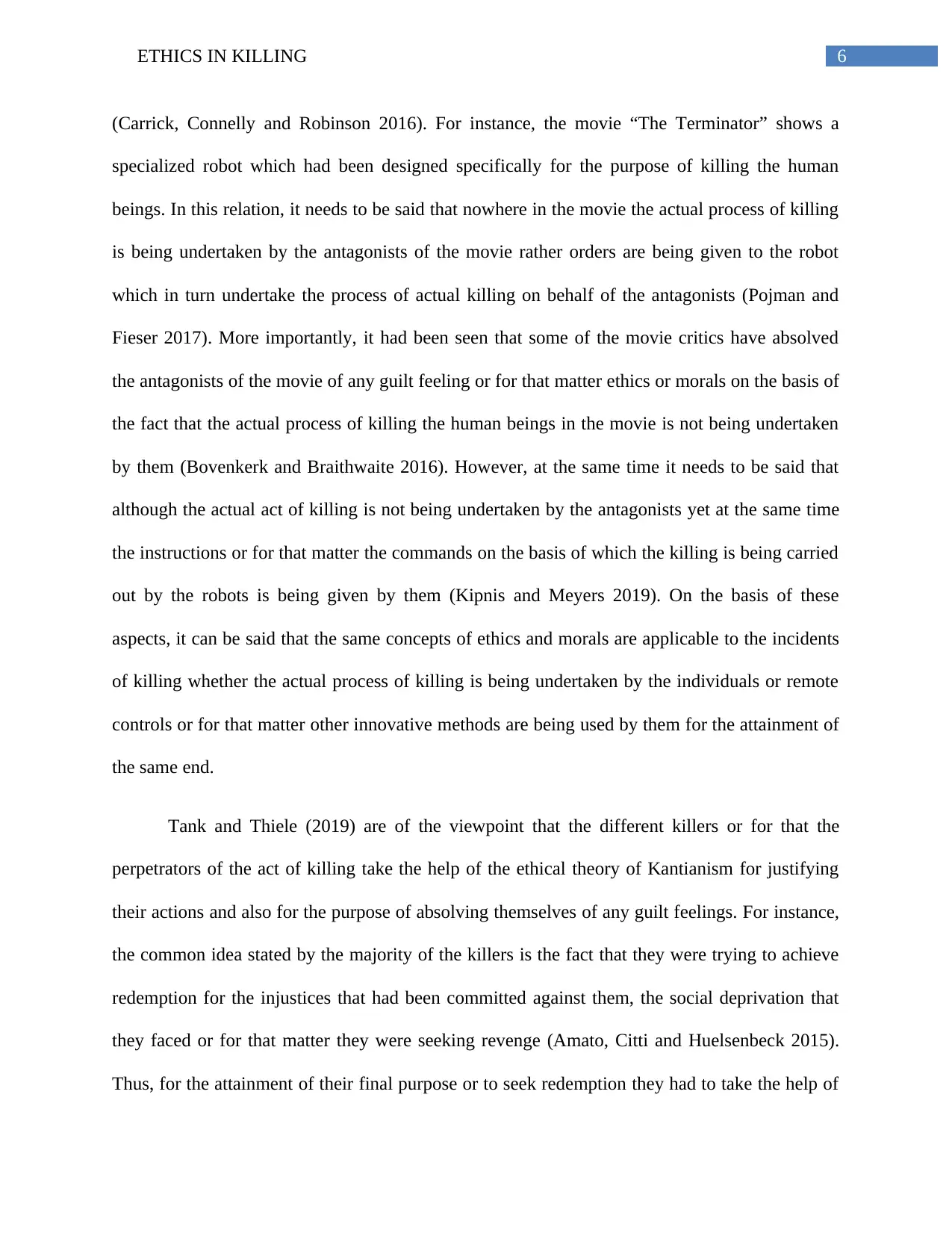
6ETHICS IN KILLING
(Carrick, Connelly and Robinson 2016). For instance, the movie “The Terminator” shows a
specialized robot which had been designed specifically for the purpose of killing the human
beings. In this relation, it needs to be said that nowhere in the movie the actual process of killing
is being undertaken by the antagonists of the movie rather orders are being given to the robot
which in turn undertake the process of actual killing on behalf of the antagonists (Pojman and
Fieser 2017). More importantly, it had been seen that some of the movie critics have absolved
the antagonists of the movie of any guilt feeling or for that matter ethics or morals on the basis of
the fact that the actual process of killing the human beings in the movie is not being undertaken
by them (Bovenkerk and Braithwaite 2016). However, at the same time it needs to be said that
although the actual act of killing is not being undertaken by the antagonists yet at the same time
the instructions or for that matter the commands on the basis of which the killing is being carried
out by the robots is being given by them (Kipnis and Meyers 2019). On the basis of these
aspects, it can be said that the same concepts of ethics and morals are applicable to the incidents
of killing whether the actual process of killing is being undertaken by the individuals or remote
controls or for that matter other innovative methods are being used by them for the attainment of
the same end.
Tank and Thiele (2019) are of the viewpoint that the different killers or for that the
perpetrators of the act of killing take the help of the ethical theory of Kantianism for justifying
their actions and also for the purpose of absolving themselves of any guilt feelings. For instance,
the common idea stated by the majority of the killers is the fact that they were trying to achieve
redemption for the injustices that had been committed against them, the social deprivation that
they faced or for that matter they were seeking revenge (Amato, Citti and Huelsenbeck 2015).
Thus, for the attainment of their final purpose or to seek redemption they had to take the help of
(Carrick, Connelly and Robinson 2016). For instance, the movie “The Terminator” shows a
specialized robot which had been designed specifically for the purpose of killing the human
beings. In this relation, it needs to be said that nowhere in the movie the actual process of killing
is being undertaken by the antagonists of the movie rather orders are being given to the robot
which in turn undertake the process of actual killing on behalf of the antagonists (Pojman and
Fieser 2017). More importantly, it had been seen that some of the movie critics have absolved
the antagonists of the movie of any guilt feeling or for that matter ethics or morals on the basis of
the fact that the actual process of killing the human beings in the movie is not being undertaken
by them (Bovenkerk and Braithwaite 2016). However, at the same time it needs to be said that
although the actual act of killing is not being undertaken by the antagonists yet at the same time
the instructions or for that matter the commands on the basis of which the killing is being carried
out by the robots is being given by them (Kipnis and Meyers 2019). On the basis of these
aspects, it can be said that the same concepts of ethics and morals are applicable to the incidents
of killing whether the actual process of killing is being undertaken by the individuals or remote
controls or for that matter other innovative methods are being used by them for the attainment of
the same end.
Tank and Thiele (2019) are of the viewpoint that the different killers or for that the
perpetrators of the act of killing take the help of the ethical theory of Kantianism for justifying
their actions and also for the purpose of absolving themselves of any guilt feelings. For instance,
the common idea stated by the majority of the killers is the fact that they were trying to achieve
redemption for the injustices that had been committed against them, the social deprivation that
they faced or for that matter they were seeking revenge (Amato, Citti and Huelsenbeck 2015).
Thus, for the attainment of their final purpose or to seek redemption they had to take the help of
Paraphrase This Document
Need a fresh take? Get an instant paraphrase of this document with our AI Paraphraser
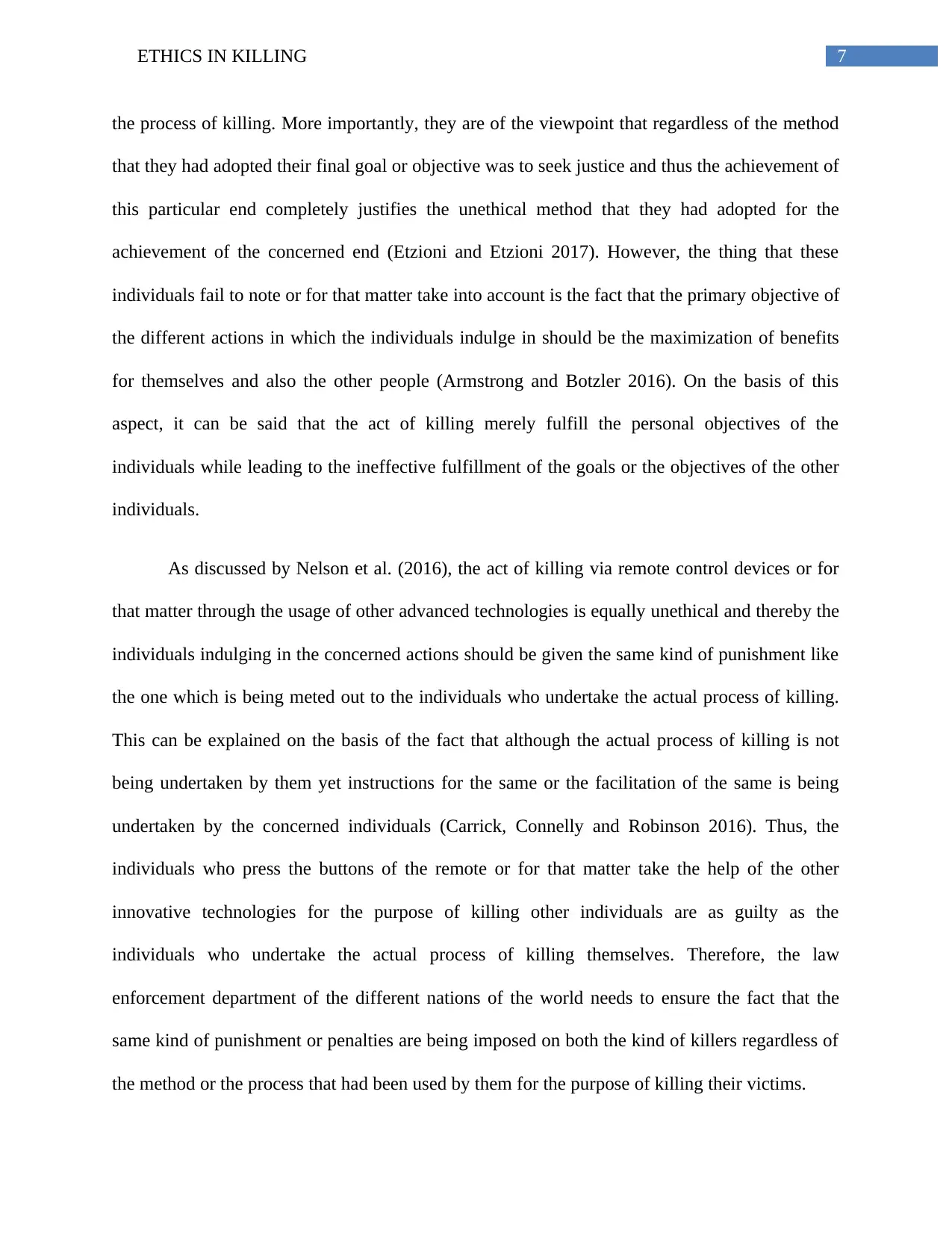
7ETHICS IN KILLING
the process of killing. More importantly, they are of the viewpoint that regardless of the method
that they had adopted their final goal or objective was to seek justice and thus the achievement of
this particular end completely justifies the unethical method that they had adopted for the
achievement of the concerned end (Etzioni and Etzioni 2017). However, the thing that these
individuals fail to note or for that matter take into account is the fact that the primary objective of
the different actions in which the individuals indulge in should be the maximization of benefits
for themselves and also the other people (Armstrong and Botzler 2016). On the basis of this
aspect, it can be said that the act of killing merely fulfill the personal objectives of the
individuals while leading to the ineffective fulfillment of the goals or the objectives of the other
individuals.
As discussed by Nelson et al. (2016), the act of killing via remote control devices or for
that matter through the usage of other advanced technologies is equally unethical and thereby the
individuals indulging in the concerned actions should be given the same kind of punishment like
the one which is being meted out to the individuals who undertake the actual process of killing.
This can be explained on the basis of the fact that although the actual process of killing is not
being undertaken by them yet instructions for the same or the facilitation of the same is being
undertaken by the concerned individuals (Carrick, Connelly and Robinson 2016). Thus, the
individuals who press the buttons of the remote or for that matter take the help of the other
innovative technologies for the purpose of killing other individuals are as guilty as the
individuals who undertake the actual process of killing themselves. Therefore, the law
enforcement department of the different nations of the world needs to ensure the fact that the
same kind of punishment or penalties are being imposed on both the kind of killers regardless of
the method or the process that had been used by them for the purpose of killing their victims.
the process of killing. More importantly, they are of the viewpoint that regardless of the method
that they had adopted their final goal or objective was to seek justice and thus the achievement of
this particular end completely justifies the unethical method that they had adopted for the
achievement of the concerned end (Etzioni and Etzioni 2017). However, the thing that these
individuals fail to note or for that matter take into account is the fact that the primary objective of
the different actions in which the individuals indulge in should be the maximization of benefits
for themselves and also the other people (Armstrong and Botzler 2016). On the basis of this
aspect, it can be said that the act of killing merely fulfill the personal objectives of the
individuals while leading to the ineffective fulfillment of the goals or the objectives of the other
individuals.
As discussed by Nelson et al. (2016), the act of killing via remote control devices or for
that matter through the usage of other advanced technologies is equally unethical and thereby the
individuals indulging in the concerned actions should be given the same kind of punishment like
the one which is being meted out to the individuals who undertake the actual process of killing.
This can be explained on the basis of the fact that although the actual process of killing is not
being undertaken by them yet instructions for the same or the facilitation of the same is being
undertaken by the concerned individuals (Carrick, Connelly and Robinson 2016). Thus, the
individuals who press the buttons of the remote or for that matter take the help of the other
innovative technologies for the purpose of killing other individuals are as guilty as the
individuals who undertake the actual process of killing themselves. Therefore, the law
enforcement department of the different nations of the world needs to ensure the fact that the
same kind of punishment or penalties are being imposed on both the kind of killers regardless of
the method or the process that had been used by them for the purpose of killing their victims.
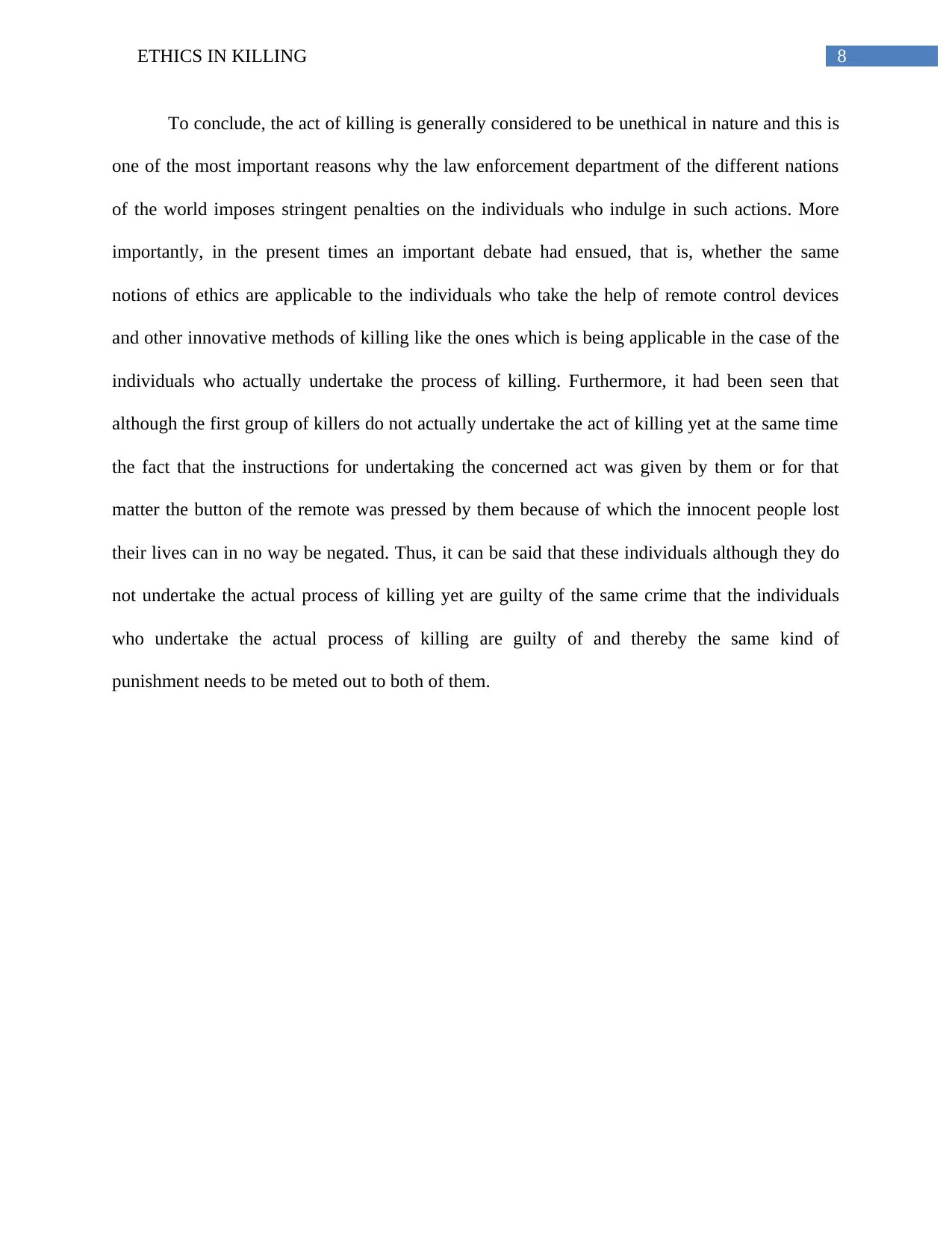
8ETHICS IN KILLING
To conclude, the act of killing is generally considered to be unethical in nature and this is
one of the most important reasons why the law enforcement department of the different nations
of the world imposes stringent penalties on the individuals who indulge in such actions. More
importantly, in the present times an important debate had ensued, that is, whether the same
notions of ethics are applicable to the individuals who take the help of remote control devices
and other innovative methods of killing like the ones which is being applicable in the case of the
individuals who actually undertake the process of killing. Furthermore, it had been seen that
although the first group of killers do not actually undertake the act of killing yet at the same time
the fact that the instructions for undertaking the concerned act was given by them or for that
matter the button of the remote was pressed by them because of which the innocent people lost
their lives can in no way be negated. Thus, it can be said that these individuals although they do
not undertake the actual process of killing yet are guilty of the same crime that the individuals
who undertake the actual process of killing are guilty of and thereby the same kind of
punishment needs to be meted out to both of them.
To conclude, the act of killing is generally considered to be unethical in nature and this is
one of the most important reasons why the law enforcement department of the different nations
of the world imposes stringent penalties on the individuals who indulge in such actions. More
importantly, in the present times an important debate had ensued, that is, whether the same
notions of ethics are applicable to the individuals who take the help of remote control devices
and other innovative methods of killing like the ones which is being applicable in the case of the
individuals who actually undertake the process of killing. Furthermore, it had been seen that
although the first group of killers do not actually undertake the act of killing yet at the same time
the fact that the instructions for undertaking the concerned act was given by them or for that
matter the button of the remote was pressed by them because of which the innocent people lost
their lives can in no way be negated. Thus, it can be said that these individuals although they do
not undertake the actual process of killing yet are guilty of the same crime that the individuals
who undertake the actual process of killing are guilty of and thereby the same kind of
punishment needs to be meted out to both of them.
⊘ This is a preview!⊘
Do you want full access?
Subscribe today to unlock all pages.

Trusted by 1+ million students worldwide
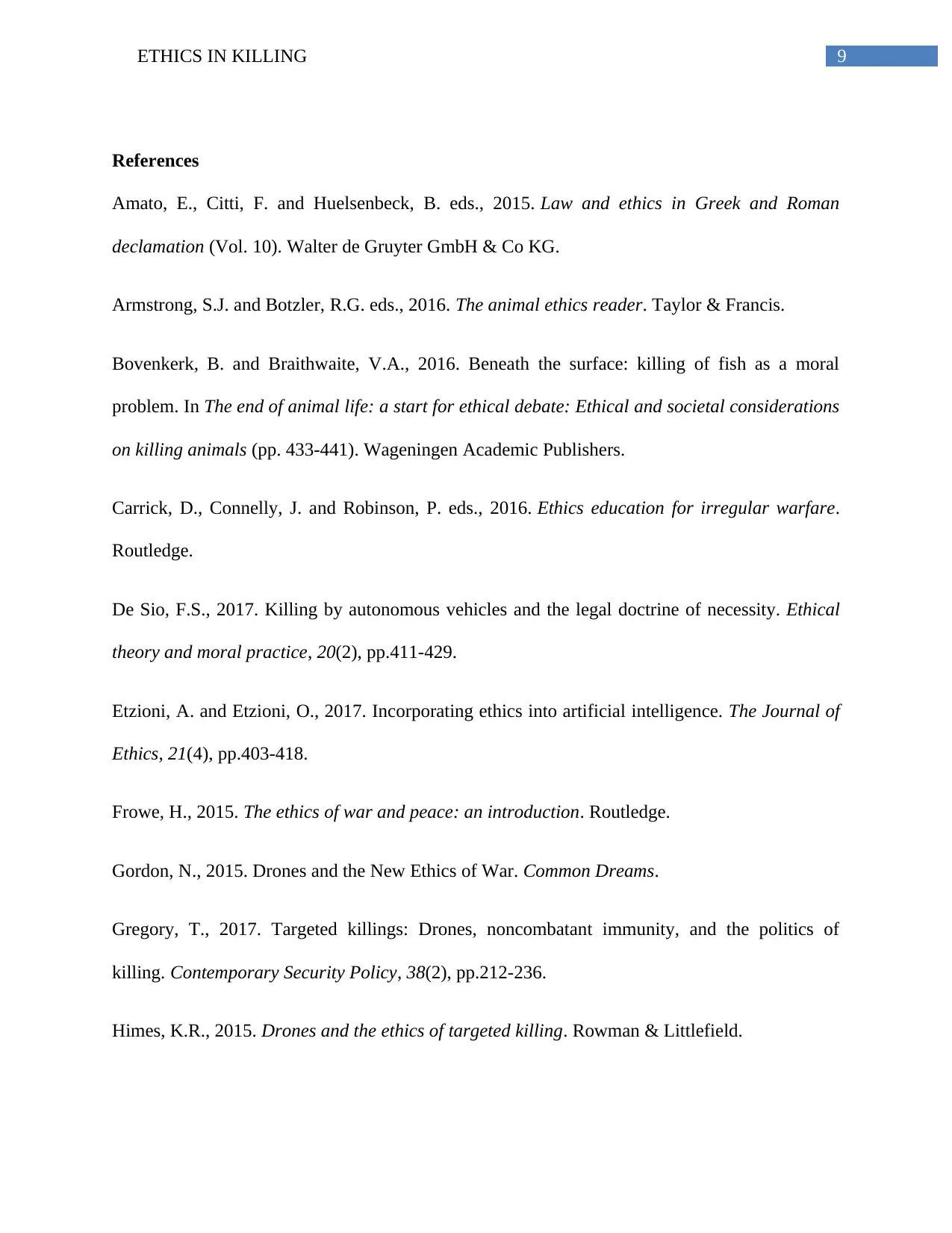
9ETHICS IN KILLING
References
Amato, E., Citti, F. and Huelsenbeck, B. eds., 2015. Law and ethics in Greek and Roman
declamation (Vol. 10). Walter de Gruyter GmbH & Co KG.
Armstrong, S.J. and Botzler, R.G. eds., 2016. The animal ethics reader. Taylor & Francis.
Bovenkerk, B. and Braithwaite, V.A., 2016. Beneath the surface: killing of fish as a moral
problem. In The end of animal life: a start for ethical debate: Ethical and societal considerations
on killing animals (pp. 433-441). Wageningen Academic Publishers.
Carrick, D., Connelly, J. and Robinson, P. eds., 2016. Ethics education for irregular warfare.
Routledge.
De Sio, F.S., 2017. Killing by autonomous vehicles and the legal doctrine of necessity. Ethical
theory and moral practice, 20(2), pp.411-429.
Etzioni, A. and Etzioni, O., 2017. Incorporating ethics into artificial intelligence. The Journal of
Ethics, 21(4), pp.403-418.
Frowe, H., 2015. The ethics of war and peace: an introduction. Routledge.
Gordon, N., 2015. Drones and the New Ethics of War. Common Dreams.
Gregory, T., 2017. Targeted killings: Drones, noncombatant immunity, and the politics of
killing. Contemporary Security Policy, 38(2), pp.212-236.
Himes, K.R., 2015. Drones and the ethics of targeted killing. Rowman & Littlefield.
References
Amato, E., Citti, F. and Huelsenbeck, B. eds., 2015. Law and ethics in Greek and Roman
declamation (Vol. 10). Walter de Gruyter GmbH & Co KG.
Armstrong, S.J. and Botzler, R.G. eds., 2016. The animal ethics reader. Taylor & Francis.
Bovenkerk, B. and Braithwaite, V.A., 2016. Beneath the surface: killing of fish as a moral
problem. In The end of animal life: a start for ethical debate: Ethical and societal considerations
on killing animals (pp. 433-441). Wageningen Academic Publishers.
Carrick, D., Connelly, J. and Robinson, P. eds., 2016. Ethics education for irregular warfare.
Routledge.
De Sio, F.S., 2017. Killing by autonomous vehicles and the legal doctrine of necessity. Ethical
theory and moral practice, 20(2), pp.411-429.
Etzioni, A. and Etzioni, O., 2017. Incorporating ethics into artificial intelligence. The Journal of
Ethics, 21(4), pp.403-418.
Frowe, H., 2015. The ethics of war and peace: an introduction. Routledge.
Gordon, N., 2015. Drones and the New Ethics of War. Common Dreams.
Gregory, T., 2017. Targeted killings: Drones, noncombatant immunity, and the politics of
killing. Contemporary Security Policy, 38(2), pp.212-236.
Himes, K.R., 2015. Drones and the ethics of targeted killing. Rowman & Littlefield.
Paraphrase This Document
Need a fresh take? Get an instant paraphrase of this document with our AI Paraphraser
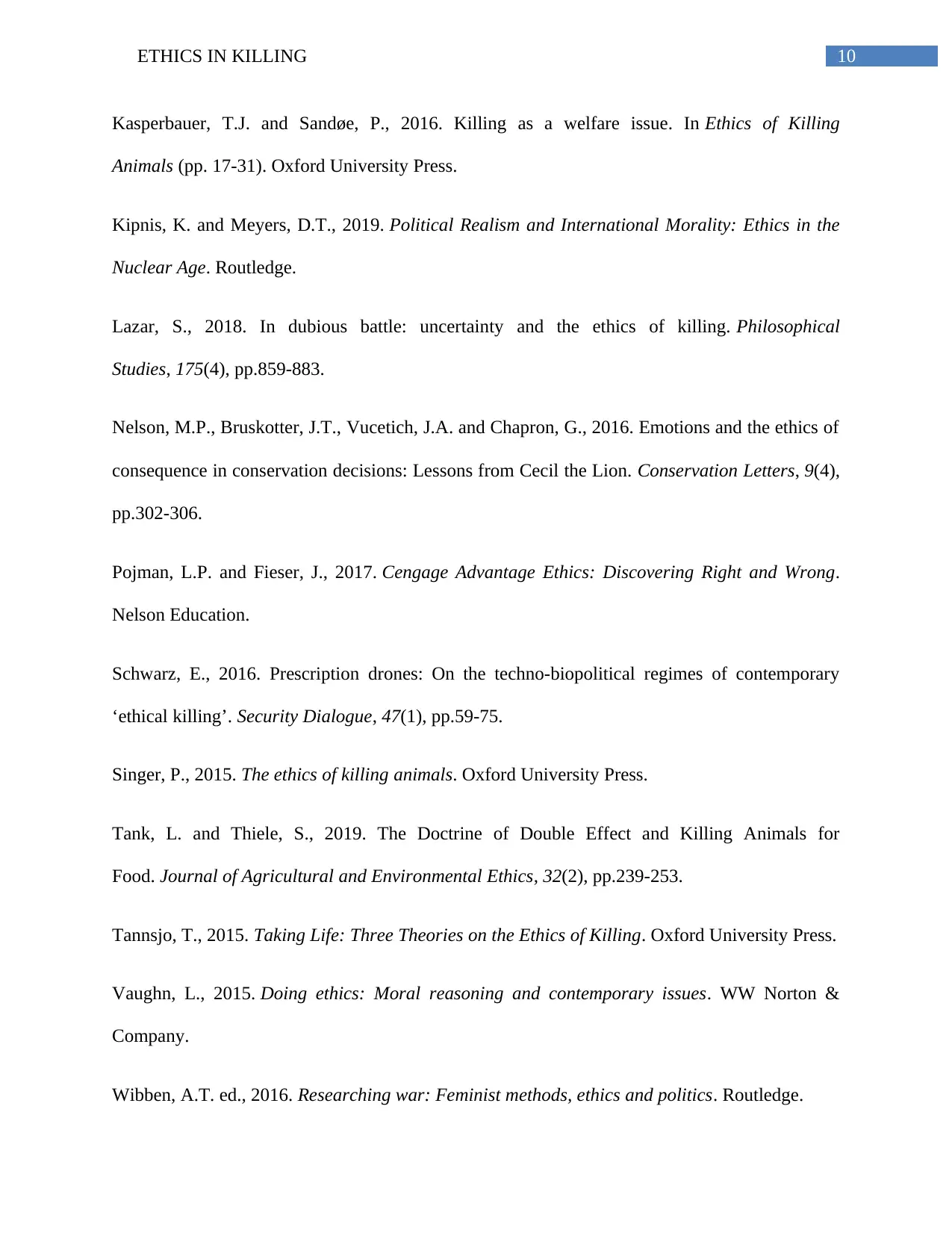
10ETHICS IN KILLING
Kasperbauer, T.J. and Sandøe, P., 2016. Killing as a welfare issue. In Ethics of Killing
Animals (pp. 17-31). Oxford University Press.
Kipnis, K. and Meyers, D.T., 2019. Political Realism and International Morality: Ethics in the
Nuclear Age. Routledge.
Lazar, S., 2018. In dubious battle: uncertainty and the ethics of killing. Philosophical
Studies, 175(4), pp.859-883.
Nelson, M.P., Bruskotter, J.T., Vucetich, J.A. and Chapron, G., 2016. Emotions and the ethics of
consequence in conservation decisions: Lessons from Cecil the Lion. Conservation Letters, 9(4),
pp.302-306.
Pojman, L.P. and Fieser, J., 2017. Cengage Advantage Ethics: Discovering Right and Wrong.
Nelson Education.
Schwarz, E., 2016. Prescription drones: On the techno-biopolitical regimes of contemporary
‘ethical killing’. Security Dialogue, 47(1), pp.59-75.
Singer, P., 2015. The ethics of killing animals. Oxford University Press.
Tank, L. and Thiele, S., 2019. The Doctrine of Double Effect and Killing Animals for
Food. Journal of Agricultural and Environmental Ethics, 32(2), pp.239-253.
Tannsjo, T., 2015. Taking Life: Three Theories on the Ethics of Killing. Oxford University Press.
Vaughn, L., 2015. Doing ethics: Moral reasoning and contemporary issues. WW Norton &
Company.
Wibben, A.T. ed., 2016. Researching war: Feminist methods, ethics and politics. Routledge.
Kasperbauer, T.J. and Sandøe, P., 2016. Killing as a welfare issue. In Ethics of Killing
Animals (pp. 17-31). Oxford University Press.
Kipnis, K. and Meyers, D.T., 2019. Political Realism and International Morality: Ethics in the
Nuclear Age. Routledge.
Lazar, S., 2018. In dubious battle: uncertainty and the ethics of killing. Philosophical
Studies, 175(4), pp.859-883.
Nelson, M.P., Bruskotter, J.T., Vucetich, J.A. and Chapron, G., 2016. Emotions and the ethics of
consequence in conservation decisions: Lessons from Cecil the Lion. Conservation Letters, 9(4),
pp.302-306.
Pojman, L.P. and Fieser, J., 2017. Cengage Advantage Ethics: Discovering Right and Wrong.
Nelson Education.
Schwarz, E., 2016. Prescription drones: On the techno-biopolitical regimes of contemporary
‘ethical killing’. Security Dialogue, 47(1), pp.59-75.
Singer, P., 2015. The ethics of killing animals. Oxford University Press.
Tank, L. and Thiele, S., 2019. The Doctrine of Double Effect and Killing Animals for
Food. Journal of Agricultural and Environmental Ethics, 32(2), pp.239-253.
Tannsjo, T., 2015. Taking Life: Three Theories on the Ethics of Killing. Oxford University Press.
Vaughn, L., 2015. Doing ethics: Moral reasoning and contemporary issues. WW Norton &
Company.
Wibben, A.T. ed., 2016. Researching war: Feminist methods, ethics and politics. Routledge.

11ETHICS IN KILLING
⊘ This is a preview!⊘
Do you want full access?
Subscribe today to unlock all pages.

Trusted by 1+ million students worldwide
1 out of 12
Related Documents
Your All-in-One AI-Powered Toolkit for Academic Success.
+13062052269
info@desklib.com
Available 24*7 on WhatsApp / Email
![[object Object]](/_next/static/media/star-bottom.7253800d.svg)
Unlock your academic potential
Copyright © 2020–2026 A2Z Services. All Rights Reserved. Developed and managed by ZUCOL.





